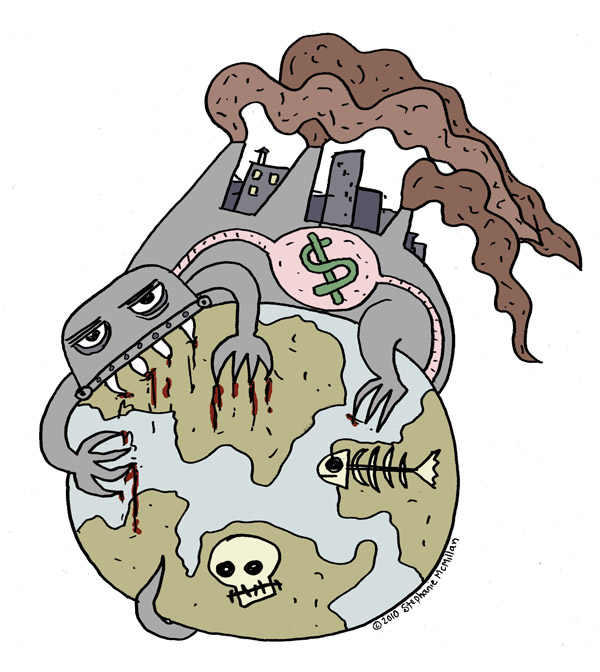By Stephanie McMillan
Global capitalism is killing the planet. It is turning the living world into dead commodities by exploiting the many for the profit of a few.
Ecocide is the most urgent and immediate problem we face. If we don’t solve it, nothing else will matter. Economic troubles (not to mention our personal issues) will seem trivial. The ability of the planet to sustain life of any kind is becoming increasingly threatened.
It may already be too late to avoid runaway global warming; and it’s certainly too late to avoid radioactive rain, shrimp without eyes in the Gulf of Mexico, and tap water that can be lit on fire. It’s too late to save 78 percent of the world’s old-growth forests or bring back the 200 species of plants and animals that went extinct today. The situation is extremely dire.
But we can’t give up – not without a fight. Precisely as the economic and ecological crises converge, the possibility of liberation and social transformation also opens up. But only if we organize to make that happen.
Ecocide is accelerating because of capitalism’s constant need to expand into new areas. Capitalists have entered a period of extreme extraction, even in areas that were previously off-limits geographically and politically. They’re now ripping up North America as wantonly as they’ve already wrecked other parts of the world, with fracking, oil from tar sands and deep-sea drilling, and mountaintop removal.
Because of competition between capitalists, which leads to a falling rate of profit, capitalism is structurally compelled to expand. It can never economically catch up with itself and must constantly break through its limits in a vain attempt to resolve its own inherent internal contradiction.
Feudalism and all forms of class society have also had internal contradictions that drove them to expand. But capitalism has taken this to a new level, because instead of just requiring more resources to continue existing (to feed an expanding agrarian population, for example), it requires the constant growth of production to expand for its own sake. The needs of the population aren’t the point, and commodities aren’t even the point – accumulating surplus value to expand capital itself is the entire point. This is what pushes it to exceed limits on a scale previously unimaginable.
But we live on a finite planet with physical limits, which are being reached. This is a difference from earlier economic crises. Capitalism is driven to consume everything external to itself, converting it to commodities, and it won’t stop doing so on its own until it kills all life on the planet. Capitalism is fundamentally in contradiction with life itself.
The system won’t stop unless we stop it.
The system has many methods of dealing with dissent. One is open repression.
Before they resort to that, they try everything else, including co-opting dissent. They draw it into dead ends created for this purpose. As long as we don’t threaten the actual relationship of power, we have many ineffective means of dissent that we’re permitted to exercise.
But capitalism can’t be reasoned with, escaped, reformed, redeemed, cajoled, abandoned, or rejected. It does not care what we want or how persuasively (or how nicely, or how rudely) we request it.
Elections won’t change this. “Less evil” politicians still serve and represent capitalist interests. It’s their job.
Personal lifestyle changes, though nice, will not make it stop. Protests and demonstrations won’t make it stop.
A better-regulated or reformed capitalism would still kill the planet. So-called “green” capitalism and technotopianism are lies to make us believe an expansionist economy could be sustainable. We can’t buy our way out of it.
If we are to liberate ourselves from this horror – if we are even to survive – we must work together to fight global capitalism and its crimes, toward the ultimate goal of bringing it down.
The system has been built on land theft, war, and slavery. It steals the means of subsistence from indigenous populations and small farmers, putting everyone in a situation of dependency, forced to sell our labor to get food and shelter.
A system based on the pursuit of profit and perpetual expansion can never be fair or sustainable. We need to study and analyze its mechanisms and motion, and identify its weaknesses and vulnerabilities.
We can attack it on many fronts, but at the center of it is the conversion of raw materials (life) into commodities through the capitalist exploitation of labor. The point is the creation of surplus value (profit) by the worker, which the capitalist appropriates – in other words, steals. There is no other reason for commodities to be produced.
To end this nightmare, workers will have to organize to liberate themselves. They are the only ones who can break the social relation of class domination, a relation that is at the core of a mode of production that requires the extraction of resources and the exploitation of workers, and results in the destruction of the environment.
In addition, we must build organizations of various types that bring to bear the energy and interests of all the popular classes and social groupings to weaken capitalism. As the crises become more acute and affect people more immediately, increasing numbers of people will come into motion to oppose it. We need to find ways of uniting all those who are antagonistic to capitalism, from various perspectives, and work together to defeat and dismantle it.
Movements for social liberation must ally with movements to defend the natural world, or we won’t be able to achieve either goal. We need a diverse, non-sectarian mass movement that can increase our chances for victory against our common enemy.
If we want to win, we must organize and align our efforts. Individually we’re weak and ineffective; together we are strong.
Let’s build a broad and autonomous movement to fight capitalism, before it destroys us!
From saltyeggs:
